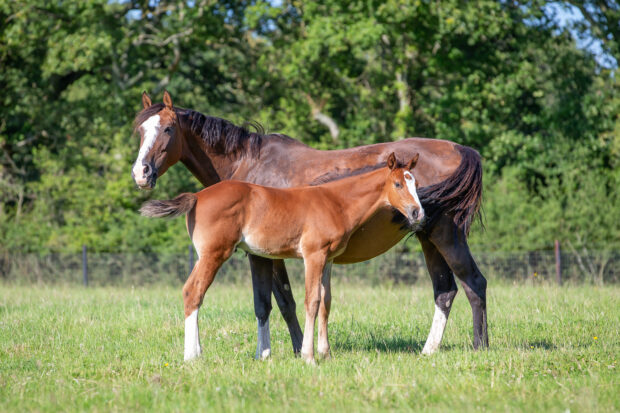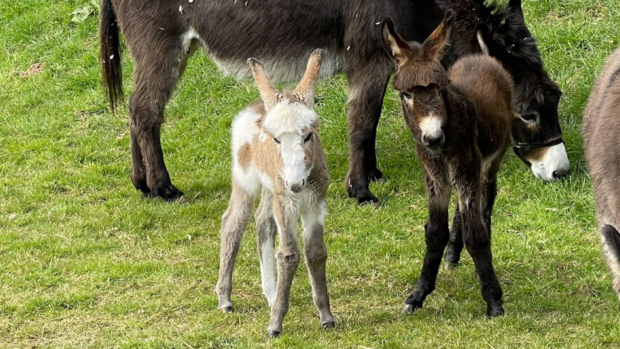For many reasons, breeding your own horse is an attractive proposition. But it’s not a cheap way of getting your next horse, so it’s important to understand what does it cost to breed a horse, assuming you have a suitable mare.
If you do decide to go ahead, what do you need to budget for?
Stud fee
While natural covering is still used, artificial insemination (AI) with chilled or fresh semen is the most common means of breeding sport horses. Stud fees can vary from a few hundred to many thousands of pounds, but an average fee for a good, proven stallion is likely to be in the region of £1000 plus VAT. Don’t forget to check the stud terms, as well as charges for health papers, collection and delivery, especially if you are using a stallion standing abroad.
Vet fees
These are inevitable, but most studs offer all-in-one packages in conjunction with a veterinary practice. Prices vary, from around £275 (+VAT) to £450 (+ VAT) for the first cycle if using chilled or fresh semen. Package components vary and it is important to understand what is and isn’t included. Packages for maiden mares and those over 18 can cost more. You can opt to pay vets’ fees in the usual way, rather than via a package if you prefer.
Stud keep charges
If your mare is to be covered naturally, she will have to go to stud. The use of frozen semen requires a high-level of veterinary attention, so sending your mare to a specialist stud is recommended. With fresh and chilled AI, it is possible to breed from an experienced broodmare at home.
The length of stay at stud will vary. If you live locally to the stud your mare can travel to and from between insemination and pregnancy confirmation. But a resident mare that doesn’t take for two or three cycles could be away for three or four months. Grass keep will lessen costs, which will soon add up if you want your mare stabled.
There will also be costs for routine horse care (teeth, feet, fodder) to consider, as well as specialist feed in the last trimester and booster vaccinations prior to birth.
Cost of foaling down
Experienced breeders can foal their mare at home, although the vet will need to attend afterwards to check the mare and foal. If you decide to send your mare to stud to foal she will need to arrive in good time and stay until the foal is strong enough to travel home. As well as the foaling fee, there will be around four weeks’ keep, some of which will be stabled.
Subsequent costs
Once the mare and foal are home, hopefully there won’t be any further major costs, aside from routine care. The foal will need a passport, microchipping, sometimes a DNA test and to be registered with the relevant breed society. If he is a colt, there may also be the cost of castration.
An extra cost may be incurred at weaning if either the mare or foal has to go away. After weaning, you will have to keep the foal for three years before he is backed. Over this time you’ll be paying for feed, worming, vaccinations and foot trimming. For those without land, field rent and/or livery charges have to be taken into consideration.
So how much does it cost to breed a horse?
| Service | Cost | Total |
|---|---|---|
| EHV vaccinations (course of 3 injections, with call outs) | £200 + VAT | £240 |
| CEM and EIA tests | £120 + VAT | £144 |
| Stud fee | £1,000 + collection fee, delivery and VAT | £1,400 |
| Stud livery (grass only) | £270 + VAT per month | £324 |
| Veterinary package for AI (chilled or fresh semen) | £345 + VAT | £414 |
| Mare’s keep for the year | £270 per month | £3,240 |
| Autumn pregnancy diagnosis | £60 + VAT | £72 |
| Flu and tetanus boosters | £75 + VAT | £90 |
| Foaling fee | £400 + VAT | £480 |
| Mare and foal vet check | £120 + VAT | £144 |
| Passport, microchipping, breed registration, DNA test | £150 | £150 |
| Three years keep including routine care | £2,500 per year (minimum) | £7,500 |
| Total approx. cost to breed a horse before backing | £14,198 | |
NB: These figures give an idea of approximate costs of breeding your own horse, providing everything is straightforward. Travel costs during this time will be extra. If your foal is a colt, then you may also have castration costs to cover.
You might also be interested in:

7 things you always wanted to know about breeding, but were too embarrassed to ask

Artificial insemination in horses: 6 key things for breeders to consider

Getting ready for your mare to foal: useful advice for first-time breeders

Subscribe to Horse & Hound magazine today – and enjoy unlimited website access all year round
Horse & Hound magazine, out every Thursday, is packed with all the latest news and reports, as well as interviews, specials, nostalgia, vet and training advice. Find how you can enjoy the magazine delivered to your door every week, plus options to upgrade your subscription to access our online service that brings you breaking news and reports as well as other benefits.





